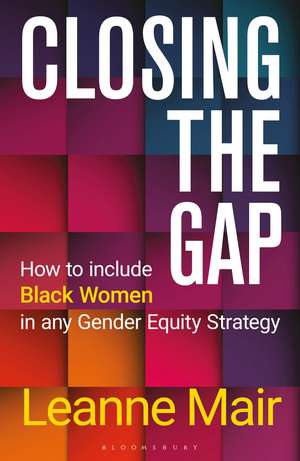Closing the Gap: How to Include Black Women in any Gender Equity Strategy
Autor Leanne Mairen Limba Engleză Hardback – 8 noi 2023
Preț: 97.21 lei
Preț vechi: 156.59 lei
-38% Nou
Puncte Express: 146
Preț estimativ în valută:
18.60€ • 19.47$ • 15.39£
18.60€ • 19.47$ • 15.39£
Carte disponibilă
Livrare economică 15-29 martie
Livrare express 01-07 martie pentru 88.21 lei
Preluare comenzi: 021 569.72.76
Specificații
ISBN-13: 9781399410366
ISBN-10: 1399410369
Pagini: 272
Dimensiuni: 153 x 234 x 30 mm
Greutate: 0.46 kg
Editura: Bloomsbury Publishing
Colecția Bloomsbury Business
Locul publicării:London, United Kingdom
ISBN-10: 1399410369
Pagini: 272
Dimensiuni: 153 x 234 x 30 mm
Greutate: 0.46 kg
Editura: Bloomsbury Publishing
Colecția Bloomsbury Business
Locul publicării:London, United Kingdom
Caracteristici
Leanne currently has over 17,600 followers on LinkedIn, with a base that continues to grow, as well as a monthly newsletter with over 2,800 subscribers. Leanne has also been selected as an official content creator for LinkedIn, and she has committed to doing a series via this platform (as well as Instagram) on the book to ensure engagement.
Notă biografică
Leanne Mair is the founder of management consultancy firm Benefactum Consulting, which is dedicated to supporting companies achieving gender equity in their business. Prior to launching her own company, she worked in asset management for over 15 years before moving into team strategy, with a focus on increasing retention of women in the workplace.
Recenzii
My least favorite question from senior leaders is: what's the one thing I should do on DEI? Now I have an answer - read this book. Closing the Gap places Black women at the center of gender equity with authority grounded in deep research, lived experience and a capacity to implement inclusive solutions. All too often workplace programs and initiatives fail to deliver agency, leaving Black women either on the fringe or even excluded. Leanne Mair shows what changes are needed and how they can be made through her power of listening to many voices and synthesizing before writing, which is all too rare in a space where many talk first.
Congratulations to Leanne, who has produced a very insightful and practical guide to better understanding the challenges that Black women face. The book includes plenty of helpful suggestions on how we can 'close the gap' by creating a supportive culture for diversity, equity, inclusion and allyship within our companies.
A thought-provoking and insightful narrative on the specific challenges facing Black women in the workplace. In addition to providing a window into this, Leanne helpfully delivers some potential solutions for all of us to consider.
Leanne Mair really hits the mark with this straight-talking analysis of the obstacles to gender equality in the workplace, seen through the eyes of Black women. An essential read for leaders and people managers, this book's direct but empathetic and practical advice is a great resource for anyone seeking to build a more equitable organization.
Closing the Gap is an urgent read for allies committed to promoting gender equity beyond performative gestures. Leanne Mair offers perceptive and honest insights on workplace experiences of Black women recognisable across organizational settings. Timely and sharp, Closing the Gap examines both entrenched and newly emerging power dynamics highlighted by shortcomings of surface-level DEI commitments. To level the playing field for women in Western societies, Mair advocates a transformative 'trickle-up' approach - moving from perceiving Black women as intruders in an unequal system to elevating Black women as evangelists of regenerative change.
In Closing the Gap, Leanne Mair highlights the intersecting and unique challenges that Black women face in the fight for gender equality. By emphasizing the importance of addressing the specific needs and experiences of Black women, Mair effectively demonstrates that achieving equality for Black women is not only crucial for their own advancement but also for the advancement of all women. This nuanced perspective encourages readers to recognize and actively participate in the dismantling of systems of oppression that disproportionately affect marginalized groups, ultimately paving the way for a more just and inclusive society for everyone.
Congratulations to Leanne, who has produced a very insightful and practical guide to better understanding the challenges that Black women face. The book includes plenty of helpful suggestions on how we can 'close the gap' by creating a supportive culture for diversity, equity, inclusion and allyship within our companies.
A thought-provoking and insightful narrative on the specific challenges facing Black women in the workplace. In addition to providing a window into this, Leanne helpfully delivers some potential solutions for all of us to consider.
Leanne Mair really hits the mark with this straight-talking analysis of the obstacles to gender equality in the workplace, seen through the eyes of Black women. An essential read for leaders and people managers, this book's direct but empathetic and practical advice is a great resource for anyone seeking to build a more equitable organization.
Closing the Gap is an urgent read for allies committed to promoting gender equity beyond performative gestures. Leanne Mair offers perceptive and honest insights on workplace experiences of Black women recognisable across organizational settings. Timely and sharp, Closing the Gap examines both entrenched and newly emerging power dynamics highlighted by shortcomings of surface-level DEI commitments. To level the playing field for women in Western societies, Mair advocates a transformative 'trickle-up' approach - moving from perceiving Black women as intruders in an unequal system to elevating Black women as evangelists of regenerative change.
In Closing the Gap, Leanne Mair highlights the intersecting and unique challenges that Black women face in the fight for gender equality. By emphasizing the importance of addressing the specific needs and experiences of Black women, Mair effectively demonstrates that achieving equality for Black women is not only crucial for their own advancement but also for the advancement of all women. This nuanced perspective encourages readers to recognize and actively participate in the dismantling of systems of oppression that disproportionately affect marginalized groups, ultimately paving the way for a more just and inclusive society for everyone.
